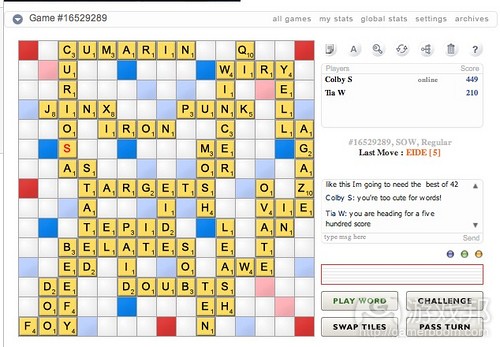简述Facebook平台的三种游戏类型
游戏邦注:本文作者是Scott Jon Siegel,原文发表于2008年1月12日。
在我看来,Facebook上的游戏可以分成3大类:“一般”,“浅度”和“深度”。这三个词是按照游戏利用Facebook社交网络功能的程度划分的,与它们本身的质量没有任何关系。
“一般”游戏:除了在Facebook平台,我们也能在其它地方看到这类型的游戏。它们多属于单人模式游戏,其玩法并没有充分利用社交网络的功能。(游戏邦注:很多游戏应用能够合理应用社交网络,创造游戏排行榜和高分共享功能,但是这些功能却并未对其核心游戏操作产生任何影响)。
这方面的例子包括Jetman,Tower Bloxx和支持玩家体验类似于《Snake》和《Tetris》等经典游戏的大量街机汇编游戏应用。其中有些应用只是简单移植到Facebook平台的Flahs内容。
“浅度”游戏:这类型的游戏虽然在游戏设置中运用了社交网络的优势,但利用范围也较为有限。像《Texas Hold-Em Poker》和曾经很火热的《Scrabulous》应用(游戏邦注:已经被Facebook移除)都是这类型游戏的代表。
这两者可以按照用户好友名单来配置潜在竞争对手。我认为《Scrabulous》是首款最擅用Facebook功能的游戏,它为玩家提供了一种类似电子邮件的游戏体验。但社交网络对其游戏设置仍未产生太大影响。
“深度”游戏:比起前面两者,这种游戏更直接有效地利用了Facebook功能,围绕社交网络创建游戏核心机制,并尽可能地采取其它措施将Facebook的特殊功能融入自己的游戏玩法中。Werewolves,Vampires和Zombies等应用便是最好的例子。这些应用在游戏设置中都绑定了Facebook涂鸦墙和PM功能,使玩家能够通过“邀请”好友而增强实力。area/code旗下的《Parking Wars》便是一个很典型的例子,这款游戏中设有一个“奇怪”的停车导向,按照这个导向玩家可以把车子停在其他好友的街道上后离开。这类游戏重塑了社交网站的定义,而游戏开发者正是围绕着这些“想象”出来的内容设置游戏。
这些游戏不仅刺激玩家邀请好友共同体验游戏,而且也由此让其获得了更多用户人气。(本文为游戏邦/gamerboom.com编译,如需转载请联系:游戏邦)
Game design for Facebook is a very different beast
by Scott
Industry veteran Brenda Brathwaite has taken a keen interest in Facebook, and its role as a nascent platform for game development. Because of the social network built into the site, and the ability for any app to tap into that network, Facebook is most definitely not familiar territory in terms of game design, something which only a few developers have realized as of yet.
As I see it, games on Facebook exist in three distinct categories, which I’m calling “flat”, “shallow”, and “deep”. These terms describe the degree to which each game takes advantage of the Facebook social network, and do not reflect the quality of each game.
Flat games exist on Facebook, but they might as well exist anywhere else. They’re almost always single-player, and do not involve the available social network through the gameplay. (I want to stress “through the gameplay,” as many of these apps do take advantage of the network to create leaderboards and share high-scores, but this does not affect how the core game operates). Examples are popular apps like Jetman, Tower Bloxx, and the copious arcade compilation apps that let users play classics like Snake and Tetris. Sometimes, these apps are simply Flash applications ported to Facebook.
Shallow games do utilize the social network in gameplay, but usually to a fairly limited degree. Examples of this include Texas Hold-Em Poker, and the ever-so-excellent Scrabulous application, both of which use your friend list to organize potential opponents. Scrabulous was the first app I encountered that made smart use of Facebook, turning Scrabble into a divine play-by-mail-esque experience. Still, the gameplay is largely unaffected by the network.
Finally, deep games take more direct advantage of Facebook’s features, building core mechanics around social networks, and using additional methods to incorporate the whole of Facebook into the gameplay. The best example of this is the Werewolves/Vampires/Zombies application(s) which took the gameplay onto Facebook’s walls and PMs, as players lured unsuspecting friends in order to increase their power. A more recent addition to the deep end is area/code‘s Parking Wars, which has users leaving cars on the streets of their friends in a strange parking-oriented version of “chicken.” Both games re-imagined the social network as something else (be it food or free parking), and built gameplay around this fiction.
Both games also offer incentives for inviting more friends to play, which contributes to their fast-growing popularity. Brenda goes more in-depth on the dark-side of Facebook propagation, but I would certainly be interested in exploring non-invasive means of designing deep Facebook games. Expect at least one more post on this topic.(source:numberless)
上一篇:心理学角度分析社交游戏魅力所在
下一篇:综观社交游戏的品牌植入活动








































 闽公网安备35020302001549号
闽公网安备35020302001549号